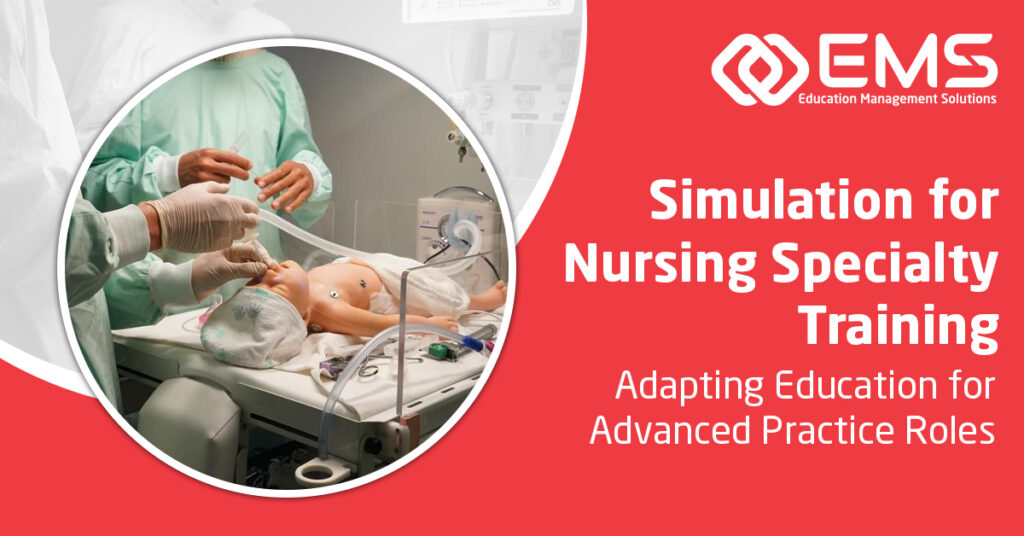The demand for advanced practice nurses with specialized skills in areas such as critical care, pediatrics, and anesthesiology continues to rise. Likewise, nursing programs face the challenge of developing curricula that prepare future practitioners to excel in these high-stakes environments—and one of the most effective solutions lies in healthcare simulation. Simulation technology has emerged as a transformative tool in nursing education, enabling programs to deliver tailored, immersive, and competency-based training for advanced practice specialties.
In this blog, we’ll explore how simulation is revolutionizing nursing specialty training, allowing educators to adapt education for roles that require advanced skills, expertise, and confidence.
Key Benefits of Simulation for Specialty Training
Simulation-based education goes beyond teaching foundational nursing skills; it has the capacity to replicate the nuanced and often unpredictable scenarios encountered in specialized care resulting in a variety of educational benefits.
Immersive Learning: Simulation replicates real-world patient care scenarios, offering hands-on experiences without the risks associated with live patients.
Skill Specialization: Advanced practice nurses can repeatedly perform procedures specific to their specialty, enhancing expertise through deliberate practice.
Interdisciplinary Collaboration: Simulation fosters teamwork among practitioners across specialties, preparing nurses to work seamlessly with physicians, surgeons, anesthesiologists, and other healthcare professionals.
Immediate Feedback: Simulation systems provide real-time feedback, enabling educators and learners to identify skill gaps and refine techniques.
Patient Safety Focus: Practitioners can practice high-risk procedures in a zero-risk environment, ensuring proficiency before entering clinical settings.
Specialty Training Areas: How Simulation Makes a Difference
Critical Care Nursing
Critical care nurses are often faced with life-or-death situations that require quick decision-making, advanced technical skills, and multidisciplinary teamwork. High-fidelity mannequins and virtual reality simulations can replicate emergency scenarios like cardiac arrest, respiratory failure, and hemodynamic instability. Nurses can hone their ability to manage ventilators, interpret complex lab results, and administer emergency medications in a simulated ICU environment.
A study found that simulation-based training increased nursing proficiency in managing ventilators and performing central line catheter insertion by 30%1. Participants reported greater confidence in handling emergencies they initially found intimidating.
Pediatric Nursing
Pediatric care presents unique challenges, as nurses must be adept at interacting with young patients and their families while managing specialized medical needs. Simulation scenarios for pediatric nursing focus on areas such as pediatric resuscitation, injury prevention, and developmental delays. High-fidelity pediatric mannequins, which replicate an infant or child’s anatomy and physiology, provide learners with realistic practice for procedures like neonatal resuscitation, administering vaccinations, and managing childhood asthma.
Anesthesiology Nursing
Certified Registered Nurse Anesthetists (CRNAs) require specialized training in the administration of anesthesia, airway management, and monitoring patient vitals under sedation. Simulation allows nurse anesthetists to practice procedures such as endotracheal intubation, regional anesthesia, and rapid sequence induction in high-pressure situations. Simulations can also incorporate complications like airway obstruction or malignant hyperthermia, preparing CRNAs to act swiftly in critical moments.
In a study featured in The Journal of the Society for Simulation in Healthcare, nurse anesthetists who completed simulation training demonstrated 40% greater accuracy in detecting anesthesia complications compared to their peers trained exclusively through traditional methods2.
Looking Ahead: The Future of Specialty Simulation in Nursing
As healthcare simulation technology continues to advance, nursing education programs have the opportunity to expand specialty training offerings further. Virtual reality (VR), artificial intelligence (AI), and augmented reality (AR) are rapidly emerging as tools that enhance fidelity in simulations, enabling even more realistic scenarios in advanced practice education. By leveraging these innovations, institutions can ensure a workforce of highly skilled nurses who are prepared to tackle the growing demands of modern care environments.
Education Management Solutions (EMS) partners directly with nursing schools so they can deliver consistent, results-driven education that meets the highest standards of healthcare excellence. Schedule a discussion with one of our solutions experts so you can prepare the next generation of advanced practice nurses today—because the future of nursing is built in simulation.

